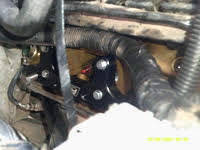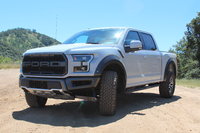2001 5.4 liter Ford F-150. I have to add a quart of oil about every one to two weeks. There is no oil leaking that I can see on the concrete. It also doesn't smoke. What do you think is going on. I know the oil has to be going somewhere.
Asked by tracieboyer May 22, 2014 at 06:05 PM about the 2001 Ford F-150 XLT Extended Cab SB
Question type: Maintenance & Repair
I'm having to add oil to my truck every on to two weeks and I don't know where the oil leak
could be because I can't see any oil on the ground. The truck doesn't smoke and is
running great.
23 Answers
It's leaking or burning but not giving an obvious sign of which . I am not sure how efficiently a cat converter is at removing pollution but I'd guess it is removing the pollutants before the exhaust gets to the tail pipe so that you don't see the old tell tale sign of white exhaust.
tennisshoes got his answer posted while I was typing mine,I'd say you have your answer
you are burning oil and that requires fixing, eventually your oxygen sensor is going to cause your PCM to malfunction and if you want to keep this car you are in for repairs. In the olden days a can of STP could keep you running and then add another and another - but with O2 sensors and fuel injection and computers it ain't so simple anymore.
Ok, let's look at this: How many miles to the quart? (not quarts per week - means nothing) How fast are you driving? I see 100,000 miles but that doesn't cause an engine to burn oil unless you have a lot of miles without benefit of an Air Filter. What weight of oil are you using? Has your fuel mileage suffered? Is there a "Check Engine" light on? Was the crankcase full of 5w-20 when you started out?
A check engine light will not come on until the sensor detects an out of range condition and by that time the cat is fried. no one runs 5-20, and I don't care about car's mileage - a quart of oil per week is rediculous. your rings are shot.
@Chassy: Sensors DO NOT detect an out of range condition - Processors do. No one runs 5w-20? I beg to differ - our entire fleet of Police Crown Victoria vehicles run the RECOMMENDED 5w-20 viscosity with no concerns - NONE! A quart of oil per week isn't crap if you're driving over 1000 miles a week. I forgive you, you know not of what you speak. Look at my profile and tell me I don't know what I'm talking about.
sensors send the info that the pcm interprets, the data is the input, if a sensor reading oxygen sends data that the pcm interprets as being outside the government regulated parameters then in my opinion they are doing the detecting and the computer is doing the interpretation. Nobody I know of runs 5-20, if your fleet does - then so be it. When I drove 180 miles per day back and forth from home to a city, if I ever went through a pint of oil I'd be shocked. I can only reiterate - sensors detect, I know nobody running 5-20 (too low a viscosity in the heat), anbd at 900 plus miles per week I NEVER used a half quart of oil never mind a full quart,
I just checked with two stores in town that carry all kinds of brands of oil and neither one stocked 5w-20 and one guy asked me if I was sure I was asking for 5-20
Tennisshoes , I agree- the question was already answered with your original answer and my original answer, it's burning oil and I suggested STP as a quick fix depending on the owner's budget.(maybe they don't make STP anymore - it is(was) a high viscosity additive) If tracieboyer has the budget then rings,etc. must be replaced to fix the problem.
If you happen to look under the hood of a MODERN car - like the aforementioned Ford, you will see - clearly marked on the oil filler cap - 5w/20 Sorry you live in the 70's somewhere where modern engines and modern engineering don't exist. Oil consumption - like fuel consumption - is measured in mileage - not time. Come join us in the modern age of 0w/20 motor oils and exotic modes of prime motivation such as Natural Gas, E85 and electricity. Gasoline engines that are built to such tolerances that running anything heavier than the specified viscosity of oil will cause cavitation (air bubbles) in the Main and Rod bearing journals and overheat engine bearings. Where Chrome molybdenum alloy piston rings last over 150,000 miles without ever wearing a ridge in the top of the cylinders. Welcome to the modern vehicle that now injects gasoline directly into the combustion chamber, adjusts the cam timing by modulating oil pressure to an actuator. How about twin-turbo chargers with impellers the size of a quarter that help a V-6 pump out over 350 HP? Ignorance is bliss - then one doesn't have to keep up with technology - just give out tired - out-dated advice.
Tracy - you are 100% correct re: modern tech and specs BUT READ THE QUESTION from the original sender ---- they were asking about a "2001 F-150", they were not talking modern tech! A whole world of people asking questions on the site are trying to keep their OLDER cars running while working with-in a restricted budget, people driving 2014 cars have warranty & dealers. Read the year of the car before you answer with modern day tech., your knowledge is useless to somebody driving an older car. Most of us are still waiting for the newest tech to start causing cars to try and park themselves while cruising down the highway. I wouldn't dream of putting 0w-20 in my 1994 DeVille,it runs 10w-30 full synthetic AND I DON'T Add (ever) more than a quart between oil changes and I do those every 5000km . SO PLEASE DO NOT GIVE 2014 answers to 2001 questions! nuff said.
read about CAFE - go to www.smartsynthetics.com and then click on Informative Articles and read them all BUT at least read the 5W-20 Motor OIl Technical Information article - you will learn a lot.
and yes I know ford switched in 2001 but please do go to above and read the other articles besides the 5w-20 one, look at the warranty one also. CAFE-CAFE-CAFE and government regs!
Nothing Magic happened in 2001 except the companies scrambling to meet CAFE rules!
As asked above: how many miles are we talking? If 800 - 1000 I would not worry so much. How is it drivin? Real heavy foot, extreme highway speeds, (80 mph+ for long distances), towing or carrying a heavy load most of the time? Oh and just for giggles what color is your engine coolant? Normal looking or is it dark looking? Also is air filter clean? Also check for signs of oil coming from pcv valve to intake.
Dadsradride answered 8 years ago
A leak down test should determine bad rings- oil past rings and defective valve stem seal ( generally on the exhaust side ) are the two most common causes of high oil use. As suggested a clean air filter or high flow type like "KnN" ect will help as they will reduce vacuum ( negative pressure) on the intake stroke pulling oil past the top ring. Excessive exhaust pressure past bad rings will increase pressure inside the crankcase and valve cover if the PVC valve is faulty- that increased pressure will push past the rings and stem seals carrying oil into the cylinder chamber to be burned. Chances are very likely your O2 sensor is faulty ( 3 mpg loss is common ) and as stated by others catalytic will fail.
I just lost my 2001 Expedition 5.4 engine because of this oil burn off not being seen at all, and no were at all leaking on the road at a 157000 miles on old motor thats is 3 quarts low, it bent a valve on the number four cylinder it stretch the timing chain enough to jump time, beware dr. Timein chain guide on both chains are plastic instead of metal and will crack and break off in pieces and cause issues with the motor be aware it might be worth 1200 bucks to have it took apart and changed the two timing chains in flares gears
I don't know if anyone will answer this, or even read this. I see the questions and answers go back from two months to two years. Just found thread this on a search. My wife just bought a 2001 E150 and the filler hole cap does indeed say 5W20. Darn, I just bought several quarts of 10W30 this morning, before I read that. This new (to her) F150 looks almost new, but has 201,000 miles. It runs just fine. Can I use the 10W30 for its first (to us) oil change?
My 2002 F150 with 184,000 miles does not use oil and I still use 5W-20 weight oil. I change the oil every 3,000 miles and it runs like new. I would suggest trying Liqui-Moly engine flush and then change the oil every 2,000 miles for a while. You may clean out the oil rings which may be sticking and causing the oil consumption. The engine flush can be bought on Amazon.
I have a 2001 F-150 with 260,000 on it. Sure it burns oil. Sure it jumps a little on the hills if I don't roll into them. But by God she will keep running to 300,000 and I will continue to baby her to 400,000. Change the oil. Keep the filter clean. And don't hot rod them! It is 17 years old.
Had forgotten about this thread until just now. Had forgotten about the advice as well. Was just in WalMart this morning and picked up 2 gallon size bottles of oil for my wife's 2001 E150 again. It will take 6 quarts. The oil is Rotella full synthetic 5W40. Maybe a van with 206,000 doesn't deserve full synthetic, but it just performed a 1,000 round trip vacation so well that I wanted to do it a favor. The 5 in 5W40 means I won't harm it on start up right? The 40 means it will have better film strength on the highway right? Thank you for any answers.
I know my two sense is late, but if it helps anyone, so be it. I have a 1997 F150 with a 4,6 engine that has 258,000 miles on it. It was using a quart every 800-1000 miles. There were no leaks and no visible oil smoke from the exhaust. I changed all the valve seals. Now, oil consumption went down to a quart every 3,400 miles. I did the job with the engine in the truck and it was difficult. I found a special tool that bolts to the cylinder head to change the valve seals and it made the job easier while the engine was in the truck.


